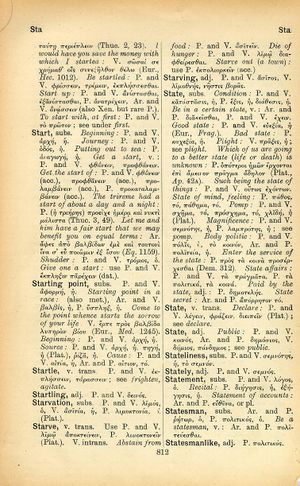state: Difference between revisions
Χειμὼν κατ' οἴκους ἐστὶν ἀνδράσιν γυνή → Mulier marito saeva tempestas domi → Als ein Gewitter tobt im Haus dem Mann die Frau
m (Text replacement - "<b class="b2">Frag.</b>" to "''Frag.''") |
m (Woodhouse1 replacement) |
||
| Line 1: | Line 1: | ||
{{Woodhouse1 | {{Woodhouse1 | ||
|Text=[[File:woodhouse_812.jpg|thumb|link={{filepath:woodhouse_812.jpg}}]] | |Text=[[File:woodhouse_812.jpg|thumb|link={{filepath:woodhouse_812.jpg}}]] | ||
===substantive=== | |||
[[condition]]: [[prose|P.]] and [[verse|V.]] [[κατάστασις]], ἡ, [[prose|P.]] [[ἕξις]], ἡ, [[διάθεσις]], ἡ. | |||
[[be in a certain state]], v.: [[Aristophanes|Ar.]] and [[prose|P.]] [[διακεῖσθαι]], [[prose|P.]] and [[verse|V.]] [[ἔχειν]]. | |||
[[good state]]: [[prose|P.]] and [[verse|V.]] [[εὐεξία]], ἡ ([[Euripides|Eur.]], ''Fragment''). | |||
[[bad state]]: [[prose|P.]] [[καχεξία]], ἡ. | |||
[[plight]]: [[verse|V.]] [[πρᾶξις]], ἡ; see [[plight]]. | |||
[[which of us are going to a better state]] ([[life]] or [[death]]) [[in unknown]]: [[prose|P.]] [[ὁπότεροι ἡμῶν ἔρχονται ἐπὶ ἄμεινον πρᾶγμα ἄδηλον]] ([[Plato]], ''[[Apology]]'' 42A). | |||
[[such being the state of things]]: [[prose|P.]] and [[verse|V.]] [[οὕτως ἐχόντων]]. | |||
[[state of mind]], [[feeling]]: [[prose|P.]] [[πάθος]], τό, [[πάθημα]], τό. | |||
[[pomp]]: [[prose|P.]] and [[verse|V.]] [[σχῆμα]], τό, [[πρόσχημα]], τό, [[χλιδή]], ἡ ([[Plato]]). | |||
[[magnificence]]: [[prose|P.]] and [[verse|V.]] [[σεμνότης]], ἡ, [[prose|P.]] [[λαμπρότης]], ἡ; see [[pomp]]. | |||
[[body politic]]: [[prose|P.]] and [[verse|V.]] [[πόλις]], ἡ, [[τὸ κοινόν]], [[Aristophanes|Ar.]] and [[prose|P.]] [[πολιτεία]], ἡ. | |||
[[enter the service of the state]]: [[prose|P.]] [[πρὸς τὰ κοινὰ προσέρχομαι]], [[κοινὰ προσέρχεσθαι]] ([[Demosthenes|Dem.]] 312). | |||
[[state affairs]]: [[prose|P.]] and [[verse|V.]] [[τὰ πράγματα]], [[prose|P.]] [[τὰ πολιτικά]], [[τὰ κοινά]]. | |||
[[paid by the state]], adj.: [[prose|P.]] [[δημοτελής]]. | |||
[[state secret]]: [[Aristophanes|Ar.]] and [[prose|P.]] [[ἀπόρρητον]], τό. | |||
===verb transitive=== | |||
[[declare]]: [[prose|P.]] and [[verse|V.]] [[λέγω]], [[λέγειν]], [[φράζειν]], [[διειπεῖν]] ([[Plato]]); see [[declare]]. | |||
===adjective=== | |||
[[public]]: [[prose|P.]] and [[verse|V.]] [[κοινός]], [[Aristophanes|Ar.]] and [[prose|P.]] [[δημόσιος]], [[verse|V.]] [[δήμιος]], [[πάνδημος]]; see [[public]]. | |||
}} | }} | ||
Revision as of 08:49, 20 May 2020
English > Greek (Woodhouse)
substantive
condition: P. and V. κατάστασις, ἡ, P. ἕξις, ἡ, διάθεσις, ἡ.
be in a certain state, v.: Ar. and P. διακεῖσθαι, P. and V. ἔχειν.
good state: P. and V. εὐεξία, ἡ (Eur., Fragment).
plight: V. πρᾶξις, ἡ; see plight.
which of us are going to a better state (life or death) in unknown: P. ὁπότεροι ἡμῶν ἔρχονται ἐπὶ ἄμεινον πρᾶγμα ἄδηλον (Plato, Apology 42A).
such being the state of things: P. and V. οὕτως ἐχόντων.
state of mind, feeling: P. πάθος, τό, πάθημα, τό.
pomp: P. and V. σχῆμα, τό, πρόσχημα, τό, χλιδή, ἡ (Plato).
magnificence: P. and V. σεμνότης, ἡ, P. λαμπρότης, ἡ; see pomp.
body politic: P. and V. πόλις, ἡ, τὸ κοινόν, Ar. and P. πολιτεία, ἡ.
enter the service of the state: P. πρὸς τὰ κοινὰ προσέρχομαι, κοινὰ προσέρχεσθαι (Dem. 312).
state affairs: P. and V. τὰ πράγματα, P. τὰ πολιτικά, τὰ κοινά.
paid by the state, adj.: P. δημοτελής.
state secret: Ar. and P. ἀπόρρητον, τό.
verb transitive
declare: P. and V. λέγω, λέγειν, φράζειν, διειπεῖν (Plato); see declare.
adjective
public: P. and V. κοινός, Ar. and P. δημόσιος, V. δήμιος, πάνδημος; see public.

